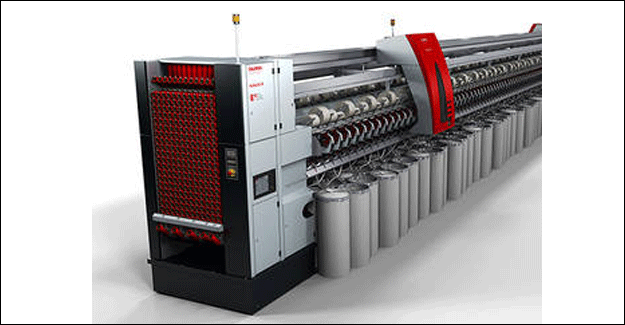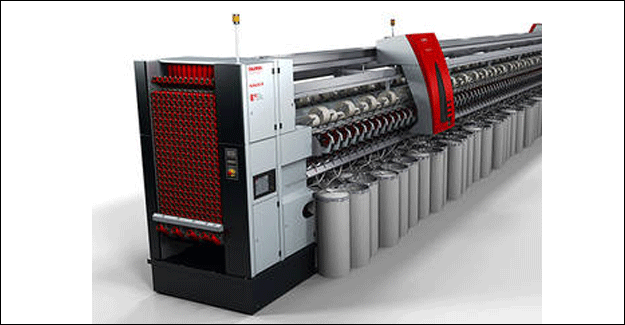
Saurer Deploys State-Of-The-Art Vacuum Trash Cleaner For Higher Efficiency
The new Vacuum Trash Cleaner (VTC) from Schlafhorst is an innovative unit for the Autocoro 9. It improves automated cleaning of the rotor spinning machine and thus increases its profitability. The VTC increases the raw material tolerance of the Autocoro 9, reducing spinning costs further. The spinning of recycled or coarse yarns generates a lot of fibre waste due to the high material throughput.
The E3-optimised innovation counteracts this. It significantly reduces the manpower required to keep the machines clean in these applications. It results in efficient machine cleaning with minimum personnel costs. The VTC is located in the middle of the machine, where it vacuums the dirt removal conveyor belt halfway. As a result, less fibre material accumulates on the belt, so that it does not pile up even with larger quantities of waste. The fibre dust can no longer fall down, get swirled up or contaminate the machine from the inside.
The machine remains clean even at high material throughput rates. The advantages of this innovation in automation are evident. The manual effort for cleaning the spinning boxes and winding devices as well as the underside of the machine is reduced substantially. The fibre waste is taken to where it belongs: the dirt collection chamber. In addition, the brush housing stays clean for much longer, meaning that brush cleaning can be reduced by up to 80%.
With a cleaning cycle of 10 minutes per machine, this measure alone quickly saves the expense of an operator. The requirements from a machine are greater raw material tolerance, better quality Maximum productivity, minimum raw material costs, and best yarn quality. A rotor spinning mill has to strike a reasonable compromise between these goals every day. With its extremely high piecing capacity thanks to SynchroPiecing, the Autocoro 9 gives spinning mills more flexibility in the selection of raw materials. The VTC now significantly boosts the raw material tolerance of the Autocoro 9 further. It prevents fibre build-ups in the spinning box area underneath the machine and thus reduces contamination of the yarn with dirt particles.
The spinning stability increases, which reduces yarn breakage. The greater cleanliness ensures better IPI values and an overall higher yarn quality. This ultimately also increases productivity, as the Corolab has to intervene much less frequently with cleaning cuts. It provides maximum added value for recycling applications. True to the E3 philosophy, the Autocoro 9 delivers triple added value to spinning mills in terms of energy, economics and ergonomics. This also makes it the benchmark for recycling. Even at extremely high rotor speeds, the Autocoro 9 achieves efficiency levels of more than 99% thanks to SynchroPiecing. With spinning components that have been specially optimised for recycling applications, the Autocoro 9 also spins yarns with higher strength from critical raw materials. A special opening roller protects the stressed fibres.
The VTC improves this already considerable added value of the Autocoro 9 – especially in long machines. This opens up new savings opportunities for spinning mills. Raw material accounts for a large part of the spinning costs. A cost saving of 1 ct/kg weaving yarn (Ne 10) with a production capacity of just under 10,000 kg per day, which is what an Autocoro 9 with 720 spinning positions can achieve, it adds up to annual savings of more than Euro 35,000 for each machine. Against this backdrop, the Autocoro 9, equipped with the innovative VTC, is likely to rapidly expand its undisputed market leadership in the price-sensitive recycling market.

Textile Excellence
If you wish to Subscribe to Textile Excellence Print Edition, kindly fill in the below form and we shall get back to you with details.












